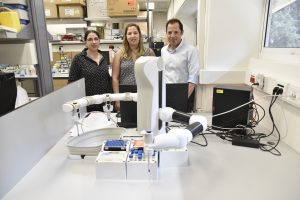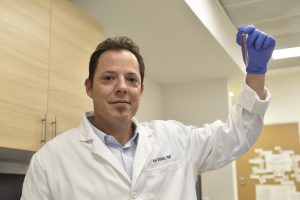Robotic Chemistry: A Significant Step on the Way to Nanoscale Medicine
In the Technion’s Faculty of Biomedical Engineering, an automatic system was developed to create a ‘nanometric package’ for sending drugs to cancer tumors in the body
Researchers at the Technion – Israel Institute of Technology have developed an automatic system for the design and preparation of stabilizing materials to produce a “nanometric package” – a platform for delivering drugs to cancer tumors in the body. In an article published in the journal Biomaterials, the researchers report that by using the innovative system, they developed the necessary materials to create the platform and even demonstrated, in preclinical experiments, its effectiveness in solid malignant tumors.
The research was conducted in the Faculty of Biomedical Engineering under the leadership of doctoral student Yuval Harris and lab director Dr. Hagit Sason-Bauer working with Yosi Shamay, assistant professor of biomedical engineering for anticancer nanomedicine and nanoinformatics.
Anti-cancer drugs such as chemotherapy and kinase inhibitors are designed to destroy cancer cells, but one of their main problems is that only a small fraction of the medicinal substance reaches its destination – the cancer cells themselves. The rest of the drugs are dispersed in the body, damaging healthy tissues. This results in the well-known side effects of nausea (as a result of damage to the intestinal tissue), hair loss, and more serious repercussions.
The damage to healthy tissues caused by anti-cancer drugs is the background for the development of dedicated “packaging” – nanometric capsules that carry the drug to the target and release it there while preventing its leakage into healthy tissues. About 40 nanomedicine products, including the Pfizer and Moderna vaccines against COVID-19, have already been approved by the U.S. Food and Drug Administration (FDA), but the development of such transport capsules is a complicated technological challenge. As such, many research groups are working to improve them.
In their Biomaterials article, the Technion researchers present a breakthrough in this topic – an automated process for developing optimal materials for the preparation of these capsules. The process is used both as a robot-chemist that synthesizes new materials and as a robot-pharmacist that formulates them into nanocapsules containing the anti-cancer drug.
“The technology we developed,” explained Asst. Prof. Shamay, “is based on an interesting phenomenon called aggregation-induced emission (AIE) – light emission based on the aggregation state of the drug. This effect means that in its solid or aggregated form, it emits a lot of light energy, but when it is soluble or stable in a capsule, it emits almost no light. Out of about 40 drugs we tested, we found 10 new drugs in which this effect occurs. They can be used as selection criteria in the automated process.”
The automatic system developed at the Technion makes it possible to know, according to the light energy emitted from the drug, which substance makes the best nanoparticles for that drug. This technique led to the discovery of a new stabilizing material whose properties give it many advantages over the existing materials used to create nanometric capsules for drug delivery.
The researchers discovered that the new material is superior in various aspects to the existing materials including efficiency, safety, the uniformity of the particles that make it up, stability over time, and the number of drugs that can be “wrapped” and stabilized with it. All of these traits make it a super stabilizer suitable for the ever expanding field of treatment using nanoscale capsules.
The new material, named R595, was created in a “green” chemical reaction, meaning a reaction that does not require the use of polluting and toxic organic solvents. It demonstrates a very high efficiency of drug loading (90%), which makes it possible to predict the treatment’s effectiveness. In preclinical trials, the effectiveness of the capsule was demonstrated in the treatment of solid tumors resulting from a mutation common in lung cancer, pancreatic cancer, and intestinal cancer.
The research was supported by Israel’s National Science Foundation and the Health Ministry. The researchers thank Victoria Zlobin from the Preclinical Research Authority at the Technion.
For the article in Biomaterials click here







